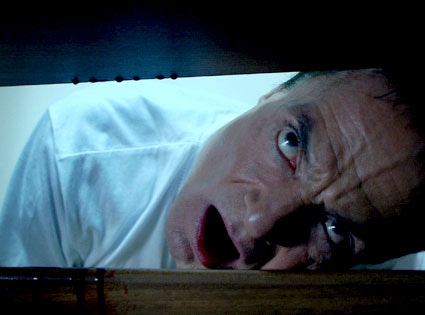 2009 sixentertainment
2009 sixentertainmentI just saw the trailer for this Human Centipede movie, and noticed that they're boasting that it's "100 Percent Medically Accurate." Two thoughts: How can that be, and why should we care?
—Jed, Texas
Well, if you've seen previews for this buzzed-about The Human Centipede, you know it's about—hmmm, how to put this—a fictional medical procedure performed on three very unwilling human captives. That's all I'm going to say about the movie plot. If you want more, Google it. Yes, I just said that. Some things are so ridiculously disturbing I can't even link to them without battling a wave of nausea.
So, about why anybody would care if a movie like this was "medically accurate"? Here goes:
Director Tom Six has said that he wanted to make the movie as authentic as possible. At the Fantastic Fest in 2009, he explained how he collared a surgeon to ask how the procedure in the movie might go if it really happened.
"And I explained the story and at first he was like, you are a crazy man," Six said. "But he read the script and said this is kind of interesting...He made for me a very detailed version of an operation how he would do it, so it's 100 percent medically accurate."
OK, great, good for you, Tom.
But why would IFC Films, which is distributing it, use that kind of information as a selling point?
I spoke to Phil Hall, a Film Threat contributing editor and former president of the entertainment PR agency Open City Communications.
"The concept of The Human Centipede is utterly ludicrous," Hall says, which is, yeah, OK, one word for it.
"But by wrapping it with the brash insistence that it could be '100 percent medically accurate,' it tries to plant the seeds that this weird and unlikely concept could be possible—which takes it out of the realm of movie lunacy and into a darker realm of science gone awry."
In other words, the movie is even scarier when you sell it as something that could, conceivably, happen.
The line also helps distinguish the film from other horror stories, says John Martin, a former Hollywood movie exec who now runs the Alamo Drafthouse Cinemas.
"It is smartly attempting to stand out from the pack with this marketing gem—however accurate that is," Martin says.
The "100 percent medically accurate" sell actually comes from a long line of shockeroo gimmicks that horror producers have used over the years.
"This harkens back to the glory days of H. Kroger Babb and William Castle and all of those charming hucksters who lured people into theaters with outlandish claims and grand promises of what they were putting on screen," Hall says.
"You don't see that kind of old-fashioned marketing tomfoolery anymore in film promotions."
No, no we don't. And if you're me, you won't be seeing the movie, either.